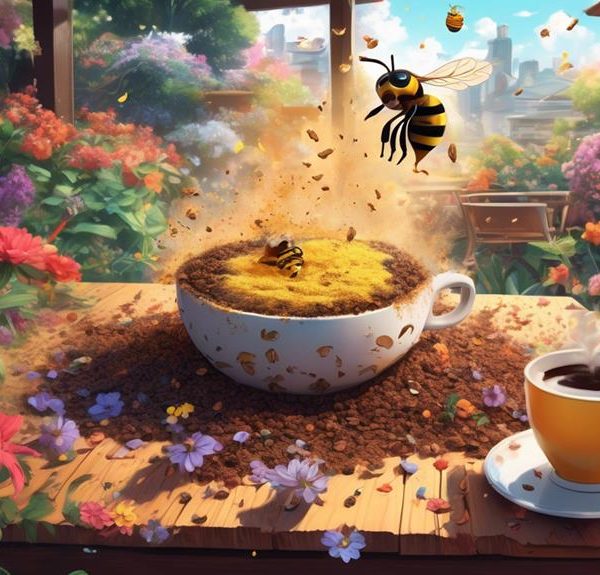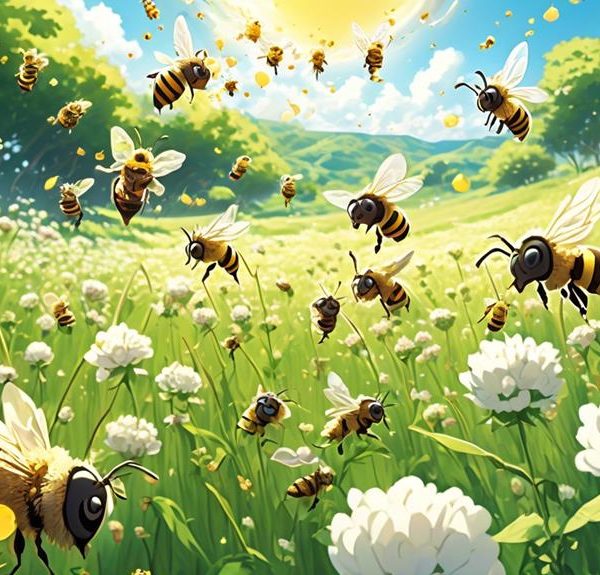Unveil the intriguing mystery of whether bees are drawn to chickens and discover the fascinating interplay of nature's diverse species.
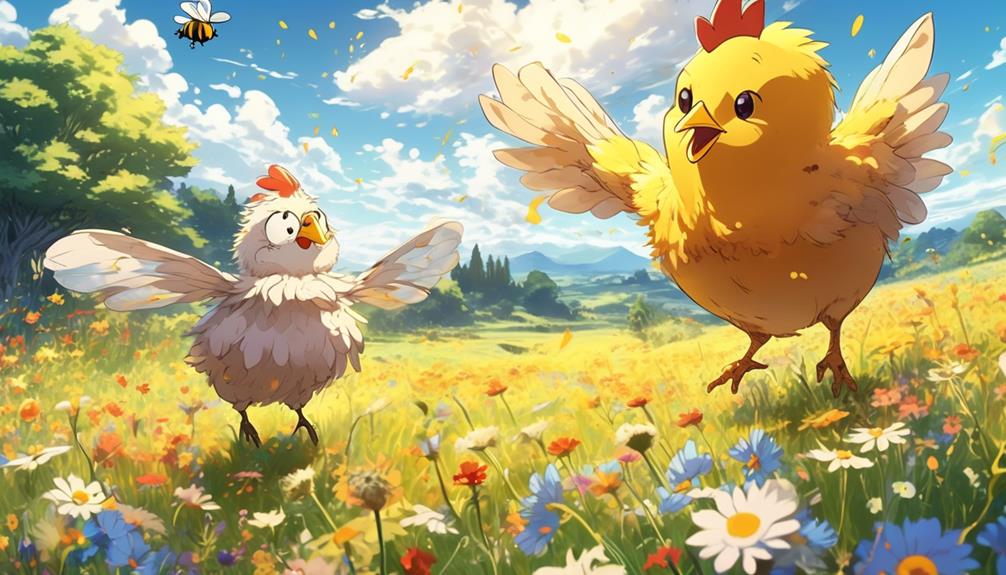
Do Bees Like Chicken?
Imagine this: You're outside in your garden, tending to your flowers, when out of the corner of your eye, you notice a bee buzzing around your chicken coop. It's a common sight, bees and chickens sharing the same outdoor space, but have you ever stopped to wonder if bees actually like chicken, or are they just cohabitating by chance?
As bizarre as it seems, it's a question that has sparked curiosity and led to some interesting investigations. It might be intriguing to explore the strange intersection of these two disparate species and what it means for our understanding of nature's complexities.
So, are you ready to unravel this mystery?
Key Takeaways
- Bees primarily consume nectar and pollen from plants and do not consume meat like chicken.
- Bees cannot digest meat due to their gut microbiota adapted to break down complex sugars.
- Bees and chickens can coexist harmoniously, benefiting each other by controlling pests and increasing flora diversity.
- The excrement of chickens, rich in nitrogen, benefits plant health and productivity, which indirectly benefits bees.
Understanding Bee's Dietary Habits
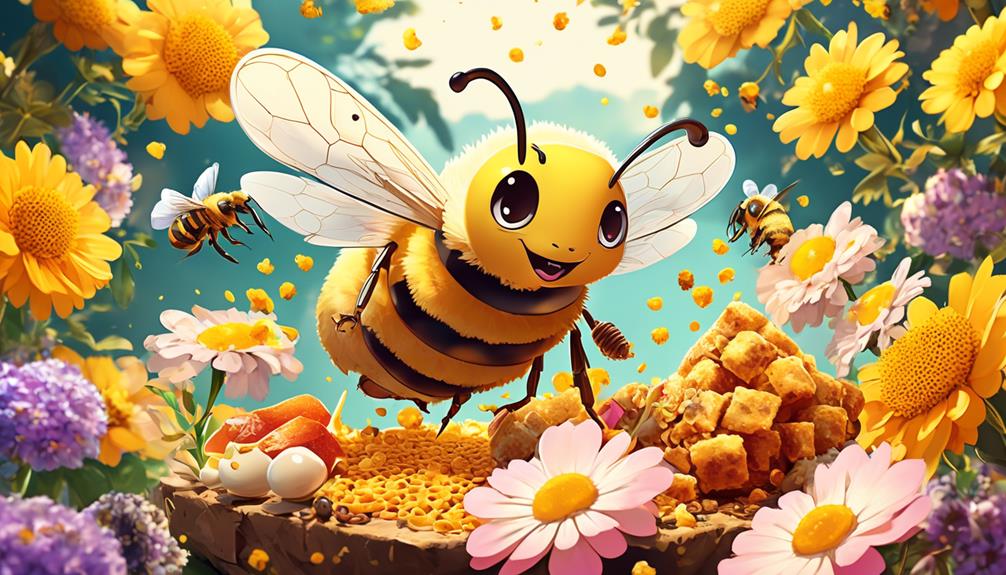
To truly grasp whether bees have a penchant for chicken, it's crucial to first understand their dietary habits, which primarily revolve around consuming nectar and pollen from plants. Now, you might be wondering why these insects prefer such a diet. Simply put, nectar provides them with the energy they need to fly and perform their daily tasks, while pollen offers the proteins and fats necessary for their growth and development.
So, where does chicken come into play? To answer that, you must dig a little deeper into bee behavior. Bees aren't typically carnivorous insects. They're pollinators and their bodies are designed to extract nutrients from plant-based sources. Their short, flat tongues and long proboscis (the tube-like mouthpart) are ideal for sucking up nectar, not for tearing into flesh. Moreover, their digestive system is adapted to process plant proteins, not animal proteins.
Consequently, it's highly unlikely that bees would develop a taste for chicken. Their dietary preferences and physical characteristics simply don't support such a notion. So, before you start leaving out bits of chicken for your local bees, remember their true nature: they're flower-loving, nectar-sipping insects with a crucial role in our ecosystem.
Chicken: A Bee's Perspective
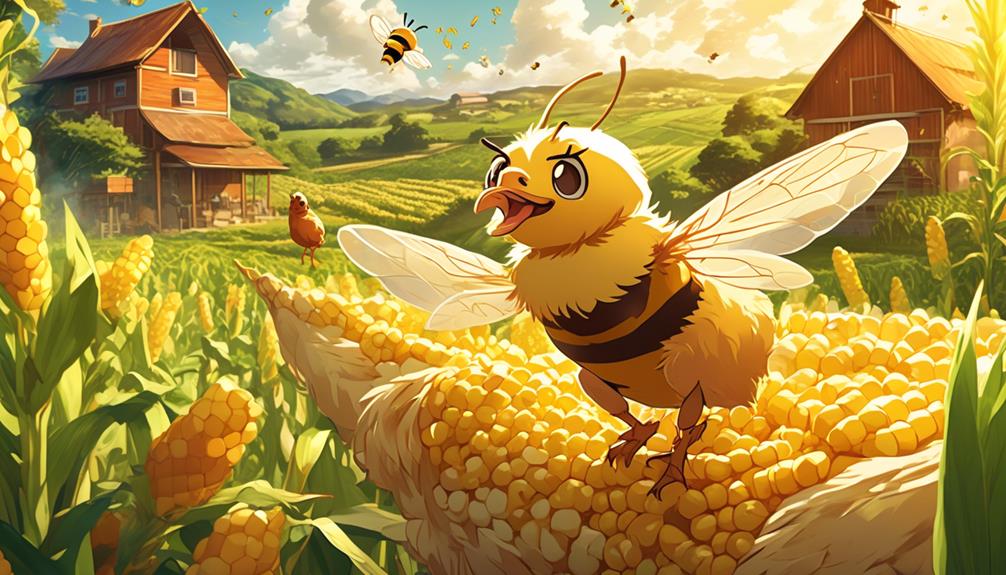
While you might think offering your feathered leftovers to these buzzing friends could be a treat, let's examine this from a bee's perspective and understand why chicken isn't exactly on their menu.
Bees, as you might know, are strict vegetarians. They mainly feed on nectar and pollen from flowers, which provide them with essential nutrients and energy. Protein, the primary nutrient in chicken, is vital for bees but they obtain it differently. Pollen, not meat, is their protein source.
Suppose you serve chicken to bees. They'd likely ignore it because they're not equipped to digest meat. Their gut microbiota, beneficial bacteria living in their digestive tract, is adapted to break down complex sugars in nectar, not animal proteins. You'd be serving a food they physically can't stomach.
Furthermore, bees have a keen sense of smell, using it to locate flowers blooming miles away. The aroma of chicken doesn't contain the floral cues bees seek out. Thus, they wouldn't identify it as food.
Case Studies: Bees and Chickens
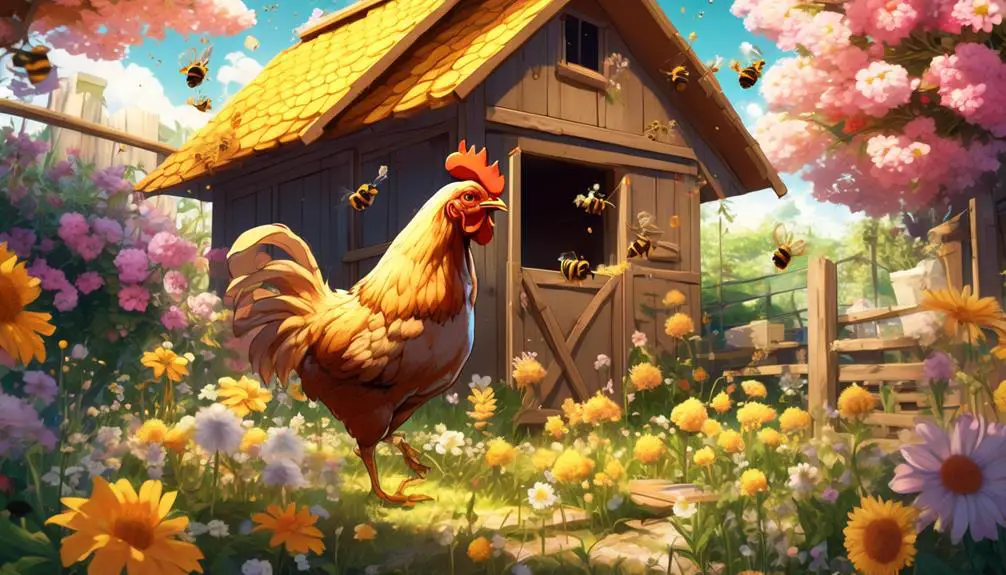
Several studies have been conducted to observe the interactions between bees and chickens, shedding light on their unique coexistence. You'll find it intriguing that these relationships often prove symbiotic.
Chickens, for instance, can help control the population of harmful pests that endanger bees, such as mites and beetles.
In a 2018 study, researchers observed a free-ranging chicken flock alongside a bee colony. Remarkably, they found a significant reduction in the number of Varroa mites, a major threat to honey bees, on the beehives located near the chickens. The chickens weren't interested in the bees but in the pests that threatened them.
Another study in 2020 analyzed the effects of chickens on the behavior of bees during the pollination process. It showed that the presence of chickens didn't negatively impact the bees' pollination efficiency, leading to the conclusion that bees and chickens can live harmoniously together.
Scientific Research on Bee Behavior
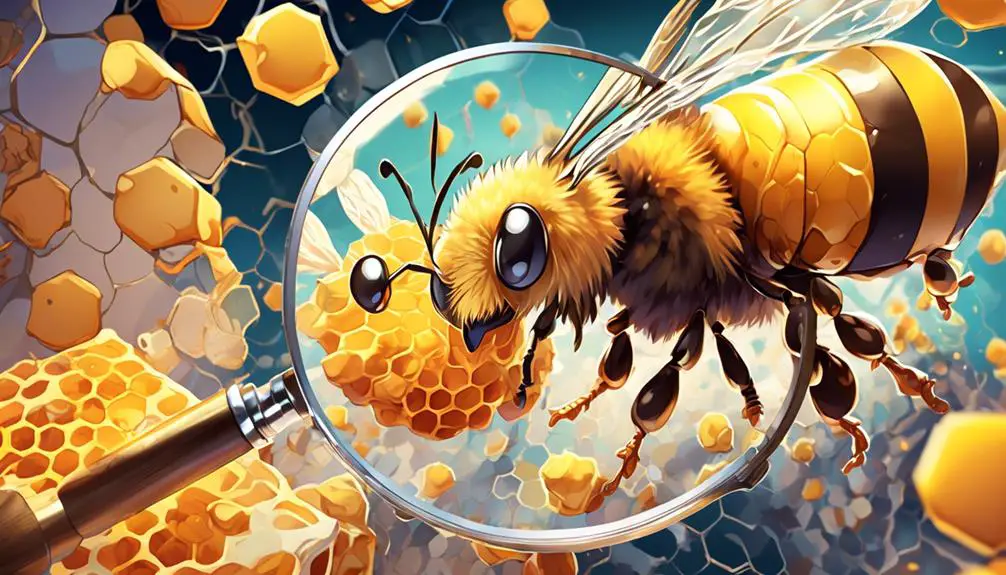
Building on this understanding of the harmonious coexistence between bees and chickens, it's essential to further explore the intricacies of bee behavior to comprehend fully why this relationship works so well. Bees are extremely social insects, living in colonies that consist of hundreds to thousands of individuals. These colonies have a highly complex and efficient division of labor, which is crucial for their survival.
The table below provides a snapshot of the roles and responsibilities within a typical bee colony:
Role | Function |
|---|---|
Queen Bee | Reproduction |
Worker Bees | Foraging, maintaining the hive, and defending the colony |
Drone Bees | Mating with the queen |
You should also note that bees communicate with each other using a combination of chemical signals and body movements, such as the famous 'waggle dance'. This dance allows forager bees to tell their hive mates the location of food sources. Considering these behaviors, it's clear that bees are highly organized and communicative creatures. Their coexistence with chickens, therefore, likely results from their ability to adapt to different environments and species without disrupting their complex societal structure.
Bees and Poultry: An Unlikely Association?
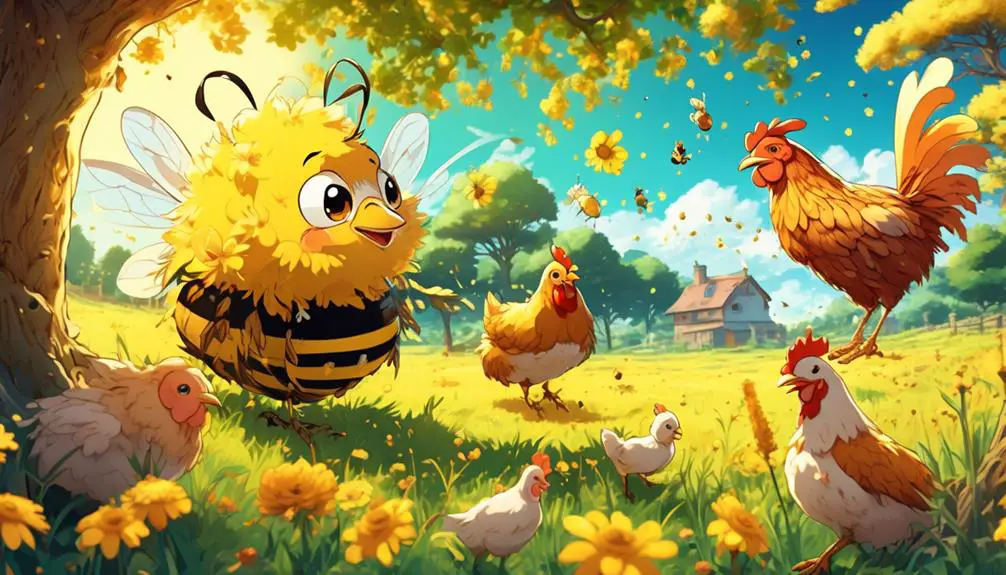
So, how do bees and chickens, seemingly disparate species, end up cohabiting harmoniously in an unlikely association? The answer lies in their unique symbiotic relationship.
Bees, as you know, are pollinators, essential for plant growth. Chickens, on the other hand, contribute to the cycle by consuming pests that might harm the bees or their food sources.
Let's delve further. Chickens are omnivores, their diet includes insects – but not bees. They're particularly fond of pests like ticks and beetles, critters that pose a threat to bee colonies. By keeping the pest population in check, chickens indirectly safeguard bees and their hives.
What's more, bees' interaction with chickens doesn't stop with pest control. Chickens tend to stir up the ground while searching for food, aiding in the dispersal of plant seeds. This can lead to an increase in flora diversity, providing more varied food sources for bees.
Reflecting on the Bee-Chicken Relationship
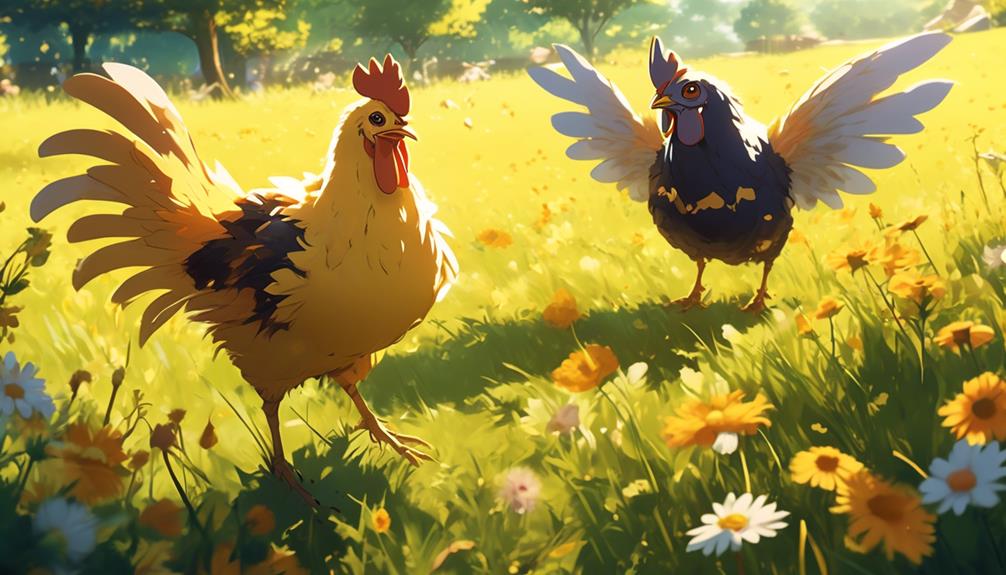
Taking a closer look at this bee-chicken relationship, it's clear that the synergy between these two species plays a significant role in maintaining ecological balance. Bees, as we know, are key pollinators, and chickens are omnivores, consuming a wide range of insects and pests. This interaction, where chickens reduce pests that can harm bees, and bees contribute to plant health and productivity, is a prime example of a symbiotic relationship.
But it's not just about pest control and pollination. Chickens, when foraging, stir up the ground, exposing insects and larvae. Bees, being opportunistic feeders, can take advantage of this exposed food source. You've likely observed this behaviour in your own backyard.
The excrement of chickens also plays a role. It's rich in nitrogen, a nutrient that plants crave. Bees benefit from healthier, more productive plants. It's a cycle of mutual benefit, a fascinating system of interdependencies.
However, it's important to note that imbalance can lead to conflict. Overpopulation of chickens can disrupt bee populations. You're part of this delicate balance, whether it's maintaining a backyard coop or planting a pollinator garden. Understanding the bee-chicken relationship helps you make informed decisions to support this ecological dynamic.
Frequently Asked Questions
Are There Any Recorded Instances Where Bees Have Stung Chickens?"
You're asking if bees have ever stung chickens.
There aren't many recorded instances of this occurring. Bees typically only sting in defense, and chickens aren't known to disturb bee hives. However, it's possible if a chicken accidentally disturbed a bee, a sting could occur.
It's also worth noting that chickens have thick feathers which provide some protection against bee stings. So, it's unlikely but not impossible.
What Are the Potential Impacts on a Chicken's Health if It's Frequently Around Bees?"
You're exploring the health impacts on chickens frequently exposed to bees. Bees won't typically harm chickens unless threatened. However, if chickens are consistently stung, it could lead to health issues like localized swelling or anaphylactic shock, though rare.
It's crucial to monitor their behavior for signs of distress. If you're keeping chickens and bees together, ensure they're not competing for resources, as this can stress both parties.
Can Chickens Eat Bees Without Any Negative Effects?"
You're asking if chickens can eat bees without any negative effects. Generally, chickens are omnivores and can eat a variety of insects, including bees. However, there's a risk if the bee stings the chicken while being eaten. This could cause discomfort or an allergic reaction.
Moreover, a chicken's diet should be balanced and varied. Therefore, it's not advisable to rely on bees as a primary food source for chickens.
Do Bees and Chickens Compete for the Same Food Resources?"
You might think bees and chickens compete for food, but they don't. Bees collect nectar and pollen from plants, while chickens peck for seeds, insects, and worms. They've evolved to exploit different food sources in the environment, reducing direct competition.
What Other Insects Are Known to Interact With Chickens as Bees Do?"
You're probably wondering what other insects interact with chickens like bees do.
A variety of insects, such as flies, mites, and lice, can frequently be found around chickens. These insects can pose a threat to their health and wellbeing.
However, beneficial insects like ladybugs and beetles can also interact with chickens, often aiding in pest control.
It's important to maintain a balance, ensuring harmful insects are minimized while beneficial ones are encouraged.
Conclusion
In conclusion, you'll find that bees don't particularly show an interest in chickens. Their dietary habits lean towards plant-based sources, especially nectar and pollen.
Case studies and scientific research highlight bees' crucial role in pollination, not poultry interaction. So, while bees and chickens can coexist peacefully within the same environment, don't expect to see bees buzzing around your chickens anytime soon. It's simply not their scene.
Remember, bees are more about the flowers than the fowl.

